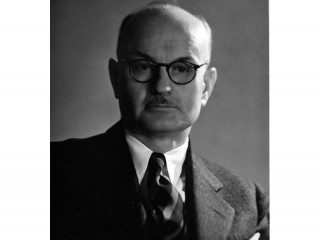
Edward Tolman biography
Date of birth : 1888-04-14
Date of death : 1959-11-19
Birthplace : Newton, Massachusetts, U.S.
Nationality : American
Category : Famous Figures
Last modified : 2011-03-10
Credited as : Psycologist, Behavior in Animals and Men, The Year of the Oath
Edward Chace Tolman was an American psychologist and one of the leaders of the behaviorist movement. For Tolman, behavior consists of deliberate acts guided by purposes and expectations.
Edward Tolman was born on April 14, 1886, in Newton, Mass. After graduation from the Newton public schools in 1907 and from the Massachusetts Institute of Technology in 1911, he did graduate study in psychology at Harvard. At Harvard (1911-1915) Tolman witnessed the initial reaction of the academic world to two new sets of psychological ideas: those of the Gestalt psychologists (Wolfgang Kohler, Kurt Koffka, and Max Wertheimer) and those of John B. Watson, the behaviorist.
Tolman's later theory of behavior is rooted in these two schools. From Gestalt psychology he borrowed the idea of pattern: in Tolman's theory, perception, motivation, and cognition are regarded as processes in which patterns of stimulation are identified and interpreted and patterns of reactions are planned and executed. From behaviorism he borrowed the idea that such mental processes must be objectively defined in terms of behavioral properties that can be objectively recorded. Such objectivity is necessary, he thought, not only in our study of the mental processes of rats, cats, monkeys, and so on, but also in our study of our own mental processes. Whatever is private or subjective in our mental processes is, he claimed, forever protected from scientific scrutiny because by definition such intrinsically private states have no influence on our overt behavior.
In 1918 Tolman went to the University of California at Berkeley, where he began to study maze learning in rats—a research program that made the department of psychology at Berkeley world-famous. In 1932 Tolman published Purposive Behavior in Animals and Men. This book presented Tolman's purposive behaviorism and reviewed the new research on rat learning done in his Berkeley laboratory.
From 1932 on, Tolman and his students turned out a constant flood of papers on animal learning. Tolman's only other book was Drives toward War (1942). This book surveyed studies of animal behavior in search of an explanation of the motives that drive men to war and a description of the social controls that would have to be enforced in a warless society. The book also shows the strong impact of Sigmund Freud upon Tolman's theory of motivation.
On June 14, 1949, the regents of the University of California handed an ultimatum to the Academic Senate: sign the new special loyalty oath or face dismissal! On that day Tolman became the leader of the nonsigners, those who were fired by the regents for refusing to submit to this naked attack upon academic freedom. After a 10-year court battle, the regents' case was repudiated by the courts: the special loyalty oath was declared unconstitutional, and the nonsigners were reinstated with back pay. On Nov. 19, 1959, Tolman died in Berkeley.
Tolman's Purposive Behavior in Animals and Men (1932) and his Collected Papers in Psychology (1951) give a comprehensive, clear survey of his ideas and experimental research. An analysis of the research in animal learning done under the influence of Tolman's criticism of the orthodox behaviorism of Clark L. Hull is in Charles Taylor, The Explanation of Behavior (1964). George R. Stewart, The Year of the Oath (1950), describes the fight for academic freedom at the University of California.
















